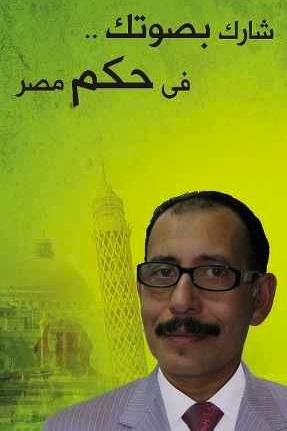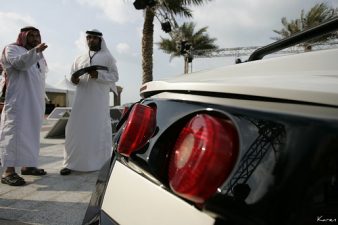 Egypt’s green environmental party was founded 25 years ago for green and social change – long before the Arab Spring. The Green Party is working to show Egyptians and the Arab world the connection between their issues and the environment.
Egypt’s green environmental party was founded 25 years ago for green and social change – long before the Arab Spring. The Green Party is working to show Egyptians and the Arab world the connection between their issues and the environment.
The year 2011 will probably be remembered as the year of the Arab Spring. And while the whole world focuses on Islamists no attention goes to the emerging Green parties in this region. That’s why we met with the new president of the oldest Green party in the region, Mr. Hisham Zayed from Egypt.
He was already there twenty-five years ago, barely 17 years old, when the Egyptian Green Party was founded. “In 1986 the German greens warned us that Laban Nido, Egypt’s national baby-milk brand, contained fall-out of the Chernobyl disaster. Instantly we decided to set up an initiative to warn Egyptian society about this,” Zayed tells Green Prophet.
This generated a new way of thinking, which made them decided to set up the Egyptian Green Party. In 1987, a first attempt to have the party established was refused by the government. But after going to court, they were finally allowed. Because, and these are the words of judiciary: “the party would be a step forward for the political life in Egypt, as they would contribute to the country’s future in an unique way.”
First headed by Dr. Hassan Ragab a scientist and diplomat, perhaps best known for the rediscovery of papyrus fabrication and the founder of the Pharaonic Village, it was the sixth party to be established in Egypt. During the 90s, an era during which Egypt experienced a lot of political activism, the party quickly gathered 32,000 members, and its youth movement rose to become the biggest in the whole of Egypt.
Planting trees in Cairo, clearing landmines
Financially unable to acquire a seat in parliament, they searched other ways to impact the region: “In 1993 we gathered all political forces in Faysal (a neighbourhood in Cairo) to plant trees and provide free medical care in the streets. By doing this, we wanted to show the other parties, Mubarak’s National Democratic Party, the centrum Party (Hezb el Wasat), the workers party (Hezb el ‘Omaal) and the Muslim brotherhood (Ikhwan al Muslimin), the need to cooperate.”
“In El Alamein we launched an initiative to remove the landmines second world war left behind. We sent letters to those responsible, Great-Britain, Italy and Germany, and held manifestations in front of their embassies during the annual celebration of the battle of El Alamein. Eventually our pressure helped gather funds to remove seven million of the fifteen million landmines in the area.”
Silenced for voicing environmental protest against Toshka
In 1998 they started protesting against the Toshka mega-project. A project to create a new river delta by diverting large quantities of Nile water in to the desert. “We saw this as a big waste of resources, and presented it as such. The project was personally supported by the president, and because of that, we paid a big price for our opposition. From then on, we were deprived from all media-coverage.”
Around the turn of the millennium Egypt underwent a big change, a regime change was being prepared for, and more and more power was transferred from Hosni Mubarak to his son Gamal. Political activities were made impossible, and in an attempt to raise legitimacy Mubarak organised presidential elections, Zayed says: “We decided not to participate in this theatre. And at that same time we faced a crisis, like all the political parties. People saw politics as useless, and rejected it. During this period the party lost a lot of its members and dynamics.”
This weren’t good times to conduct politics so they directed their energy elsewhere. They started contacting other green parties in the region and in 2008 they organised a meeting of all Arab Green Parties. Hisham Zayed also presides over the Arab Green Parties, which represents parties in Morocco, Algeria, Tunisia, Lebanon, Egypt, Palestine, Yemen and Iraq.
After the revolution everything changed. Politics rose to the surface, and the party decided to take part in the elections. The young faction took charge of the party, and in the last three months they started redesigning the party and its program.
At present the Green Party has 40,000 members and offices in 12 of the 24 governorates. Four of their candidates (in Giza, Alexandria, Qalyubia and Sohag) are running for a seat in the parliament.
“We weren’t offered time to prepare for these elections, and are still busy restructuring the party,” he says, but besides elections they also continue to engage in campaigns, just like they did in the past. Against Damietta’s polluting chemical plant for example, where polluted livestock caused local fishermen to clash with authorities. Instead of dedicating all their time to the elections, the green party joined the protests and issued declarations. That’s the role they want to keep on playing, or as they put it: “The government doesn’t do anything when they are not forced, so we have to force them.

Protesting against Damietta this year. image via almasryalyoum
“We are trying to move away from the existing fractions and create an alternative for what is called Islamist, liberal, socialist, right or left. We want to create a new national thinking that puts into consideration and fosters the unique nature of the Egyptian society,” Zayed tells Green Prophet.
Their inspiration comes from the principles and values that are at the base of Egyptian civilisation.
But these values are hard to define, and it often leads to heavy discussions. A good example is the slogan “God, humans and the environment.”
Marwa, a young party member, tells Green Prophet: “Me myself I said no, we must kick this out and only talk about humans and the environment.
“You know they say this is the new fashion in Egypt, to say Allah, Islam and Allah. I wanted it different – to keep the message away from the fashion. But the older members insisted on keeping it, because these values play such a big role.
“We are a religious society, and Allah means God to both Christians, Jews and Muslims. It’s not Islamic, but Egyptian, and Egyptians are religious. It is a very tricky discussion and we also want to move away from mixing religion with politics. The values of traditional society and Islam have always played a big role in our civilisation, but not Islam itself.”
Egypt is very rich in natural resources, but they are either wasted by poor use or non-use. “In our program we concentrate on two items, water and energy. Egypt is very rich in solar energy, in a way that is equivalent in oil for the gulf countries. We are trying to raise awareness about wind and solar energy.”
They are already contributing to the Desertec project, a gigantic field of solar panels, to supply Europe with energy.
Typically, the project didn’t get started when the former regime left power.
The Green party is questioning fuel subsidies and other resources. “We want to support clean energy and subsidies should be directed to clean alternatives because this would support sustainable development,” says Zayed.
And there are too many problems in Egypt considering the management of water. “We think the River Nile should be managed from its source to its mouth. All the countries of the Nile must form a vision on how to use the Nile and develop it.”
So how can the environment become a priority amidst revolutions? A popular slogan during the revolution was “bread, freedom and social justice.” All these issues are closely linked to the green party. Or as another spectator, Mohamed Abdel Raouf, puts it, the environmental themes were a “hibernating phenomena” that led to the uprising.
“Eighty percent of the slogans were related to the depletion of the environment, through pollution, diseases or bad housing conditions. But the vast majority of the people barely realizes, they protest against diseases but don’t think about what causes it. That’s why the green party tries to extend the debate beyond what is considered environmental.”
“The manifestations in Tahrir have also showed a change in minds. Nowadays protestors try to keep the square and consider the environment as their home. But once you leave Tahrir, you discover that they are still a small minority. Those who are just too lazy and are merely watching, what we call hizb kanaba (the sofa party), is still too big.”
Luckily the Egyptian Green Party isn’t prepared to give up quickly: “In these elections we don’t expect to win any seats. Our primary goal is to further raise awareness and prepare ourselves for coming elections,” Zayed concludes.
Rectification: At the time of the interview the leadership of the Egypt’s green party was the subject of a juridical dispute between Mohamed Awad and Hisham Zayed. After a long juridical battle, the Civil Court made their final ruling in favour of Mohamed Awad on 12 februari 2012.




Simply,you met with wrong person.
The namne you said Hisham Zayed Is not the Egyptian Green Party representative,even for time being he is not a memeber.He was one of the followers of the old regiem with all meaning of the ward.
Regards
Mohamed Awad
Chief of executive & admin.Coomittee of Egyptian Green Party
Does the Green Party of Egypt cooperate with the Nobel Prize Winner Prof. Dr. Ahmed Zewail, who plead in favour of a better dialogue between East and West, and North and South? “Fear and misunderstanding disperse us as humans”he declared in an interesting interview in the Periodic of the Dutch Association of Dutch Chemists from 2008.
Perhaps the Green Party can request him to become their adviser?
Prof. Zewail had his education in Egypt and is now active in the Linus Pauling chair of chemical physics on the California Insitute of Technology.